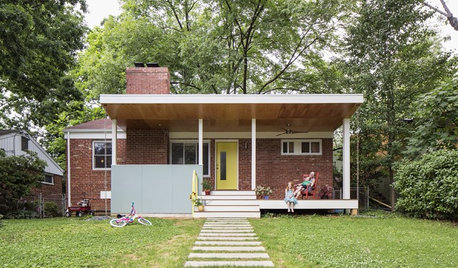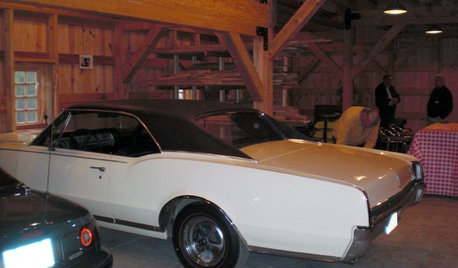US Home Ownership in Decline -- A Good Thing
chisue
7 years ago
last modified: 7 years ago
Featured Answer
Sort by:Oldest
Comments (134)
ncrealestateguy
7 years agoUser
7 years agoRelated Discussions
Good thing my new house was only on paper, It's GONE!
Comments (14)adellabedella, I can see the similarities in our floor plans! Do you have any photo's of your kitchen? I'd really like to see how it looks open like that. I have seen many floor plans with similar layouts, just not photo's. LOVE your granite, pretty, pretty, pretty! I'm going to play around with the Masterbed/bath area - just our closet space (MUST have a him and her one) is hard to work in. flgargoyle, gee... I was hoping since I was able to make that staircase squeeze in my plan.. it would work! :( but in reality.. my little $39 program is telling me your correct! Does this mean that hall need to be longer than 13'..?! Or should it go wider, staircases confuse me! As for the all windows in the kitchen.. I've been DROOLING over some photo's I have in a book and online. The house is actually going to be in reverse, which makes the kitchen side on the west. Really, the worst possible side for our FL exposure. Still - I have to go back before I finalize things and look at more kitchen inspiration photo's. chisue, GREAT suggestion in regards to fixed french doors.. I had NO IDEA they even existed.. that's why I LOVE this forum! As for the laundry area/closet /stairs.. I don't feel this area is right yet. Just not sure of a better layout, but I'm going to play with it. Maybe I'll get rid of the back staircase, which will only go up to a storage area. Currently, we have a drop down stairs, and although not the greatest, it would open the area up for more uses.. maybe even a toilet!! LOL However, storage/closet space is more on my want/need list. REALLY great feedback, and lots more food for thought.. Thanks everyone!...See MoreI question home ownership
Comments (34)It's really none of my business, but when you say the house sold for twice what you paid for, you mean twice what you paid for the house originally, right? Not twice the cost of the house itself plus your real-estate agent's commissions plus the furnace you put in and the paint and carpeting and appliances you replaced and the new lawnmower you needed because the one you had died of old age? That's correct. The price we got was more than twice the original price we paid. But even after subracting the realtor's commission, the hot tub and the fenced yard we added, (and enjoyed over the years), the lawmmower we bought,etc., we still cleared a sizeable amount of money. Which we would not have had we rented for those 14 years. In addition, every year we had a tax deduction for the interest and property taxes. And we would have had to live somewhere. Because the home was new when we purchased it and because DH is very,very good about maintenance, the roof was in great shape, the appliances in excellent working condition (we took the washer/dryer with us and still have them). We busted our chops designing and landscaping it ourselves, but we enjoy gardening, so it was not considered a hardship. We enjoy owning. It's very hard to make an accurate $$ to $$ comparison on the own vs rent question. There are so many variables. And not everyone is cut out for the maintenance that home ownership demands. When I was single, I knew I could not/would not maintain a sgf, so chose to purchase a condo (before marrying DH). I enjoyed many of the aspects of home ownership, but there were also some downsides. There is no "one size fits all" answer. (Thank goodness - as a landlord, I LOVE folks who prefer to rent)...See MoreGood things to buy from Directgardening / House of Wesley?
Comments (10)Nothing is a good deal if it arrives moribund or dead. Another thing to watch out for are dubious "guarantees". Here's the one from Direct Gardening's website: "If any item you purchased from us does not live, for a FREE REPLACEMENT just RETURN THE ORIGINAL SHIPPING LABEL along with your written request within 1 year of receipt. If you are dissatisfied with any merchandise, return it together with the ORIGINAL SHIPPING LABEL within 1 year of receipt for a FREE REPLACEMENT. Replacement guarantee is VOID unless the ORIGINAL SHIPPING LABEL is returned. For a REFUND of the purchase price, RETURN THE ITEM AND THE ORIGINAL SHIPPING LABEL, with the correct postage affixed, within 14 days of receipt." I doubt that many people are aware that they have to hang on to the shipping label to get a replacement* (in these days of computerized records this should not be necessary). I would also avoid like the plague any company that makes you ship the dead/dying plants back to them (reputable firms in my experience never do this). And if you receive what's supposed to be a dormant perennial and it turns out it's dead, you won't realize this within 14 days, so sorry, forget about a refund. *If the "replacements" are also dead or dying (as reported by multiple customers on Garden Watchdog), they are no bargain either....See MoreGood things happening around us
Comments (15)We do have the state wide stay at home order so the private golf course we live on isn't open (yet?). There's a petition to allow golf courses to be open with a long list of precautions - more than a single person in a cart. However the golf course is allowing people to walk on the course which has a wonderful hard surface cart path throughout the entire 18 holes. It's been nice to be able to use it in this way - hopefully those who don't know enough to stay on the cart path and/or pick up their dog doo won't ruin it for everyone. We're just starting to have some beautiful sunny, near 60 degree days which have been delightful. I saw my first robin yesterday and a pair of wood ducks. I had a very positive shopping trip today. I'm still doing my own grocery shopping as too many things aren't available for delivery and it takes days. I was astonished at how nice the shopping experience was. I went to Costco, Target, Walgreens and Aldi. I took advantage of the 60+/compromised/disabled early shopping hour at Costco and that was a dream. I don't know if it will stay that way or if all the eligible people haven't figured it out yet. It wasn't crowded and they had everything I wanted which was just a few select items. I'm not eligible for early shopping at Target so got there about 9:00 - no crowds, very clean, very well stocked. They had everything I wanted except the things they never stock like stewed tomatoes. I picked up two cans of those at Aldi. Then I picked up a prescription at Walgreens - hardly anyone in the store. The only thing I cannot find any where is the particular type of dental floss I Iike. It's a J&J brand and there was another time when J&J had none for an extended period of time - I think during the economic collapse. I think I found a box of small sample size containers on Ebay. Might have to check there again. All in all a good day and frankly any day that we are well is a good day....See Morechisue
7 years agochisue
7 years agoUser
7 years agolast modified: 7 years agoC Marlin
7 years agolana_roma
7 years agochisue
7 years agobry911
7 years agolana_roma
7 years agobry911
7 years agolast modified: 7 years agotete_a_tete
7 years agolast modified: 7 years agolana_roma
7 years agolast modified: 7 years agoAnglophilia
7 years agolast modified: 7 years agoUser
7 years agoUser
7 years agolast modified: 7 years agoUser
7 years agolast modified: 7 years agoUser
7 years agochisue
7 years agochisue
7 years agowritersblock (9b/10a)
7 years agolast modified: 7 years agolana_roma
7 years agowritersblock (9b/10a)
7 years agolast modified: 7 years agobry911
7 years agolast modified: 7 years agoAnglophilia
7 years agolast modified: 7 years agobry911
7 years agolast modified: 7 years agorob333 (zone 7b)
7 years agobry911
7 years agolast modified: 7 years agotishtoshnm Zone 6/NM
7 years agobry911
7 years agorob333 (zone 7b)
7 years agoHockeymom84
7 years agochisue
7 years agolast modified: 7 years agoUser
7 years agoncrealestateguy
7 years agoHockeymom84
7 years agolast modified: 7 years agoHockeymom84
7 years agobry911
7 years agolast modified: 7 years agochisue
7 years agoAnglophilia
7 years agobry911
7 years agoncrealestateguy
7 years agoUser
7 years agolast modified: 7 years agoUser
7 years agolast modified: 7 years agofreeoscar
7 years agolana_roma
7 years agolast modified: 7 years agobry911
7 years agoAnglophilia
7 years agolucillle
7 years agolast modified: 7 years agoUser
7 years agolast modified: 7 years ago
Related Stories

LIFETake Ownership of Your Rental's Green Factor
Just because you rent doesn't mean ecofriendly living is beyond reach. These 16 tips can help
Full Story
GARDENING FOR BUTTERFLIESGardening for the Bees, and Why It’s a Good Thing
When you discover how hard bees work for our food supply, you may never garden without them in mind again
Full Story
ARCHITECTURE4 Things a Hurricane Teaches You About Good Design
When the power goes out, a home's design can be as important as packaged food and a hand-crank radio. See how from a firsthand account
Full Story
LIFEYou Said It: ‘Happy Is Such a Good Thing’ and More Quotes of the Week
Holiday prep and New Year’s plans have been filling our time at home this week
Full Story
PRODUCT PICKSGuest Picks: Beautiful Things You Can Feel Good About Buying
Upcycled, ecofriendly or just made responsibly, these home accessories and furniture pieces will keep your conscience clear
Full Story
MOVINGWhy So Many New U.S. Homes Are Supersized
A bigger share of new homes sold in 2015 were 4,000 square feet or more compared with before the recession. But that could change
Full Story
FEEL-GOOD HOMEWhat Really Makes Us Happy at Home? Find Out From a New Houzz Survey
Great design has a powerful impact on our happiness in our homes. So do good cooking smells, family conversations and, yes, big-screen TVs
Full Story
FEEL-GOOD HOMEGuys Tell Us About Their Favorite Places at Home
For Father’s Day, Houzz men show us the places in their homes where they like to hang out
Full Story
HOUZZ TOURSMy Houzz: Goodwill and Good Taste in a Grand Colonial
Welcoming the community for charity fundraisers and more, this Massachusetts home radiates graciousness
Full Story
FARM YOUR YARDHello, Honey: Beekeeping Anywhere for Fun, Food and Good Deeds
We need pollinators, and they increasingly need us too. Here, why and how to be a bee friend
Full Story




ncrealestateguy